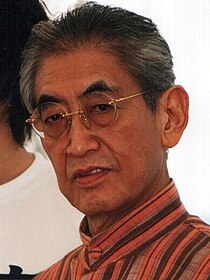Nagisa Ōshima
Nagisa Ōshima ( Japanese 大 島 渚 Ōshima Nagisa ; born March 31, 1932 in Kyōto , Japan , † January 15, 2013 in Fujisawa , Japan) was a Japanese film director and screenwriter .
Life
When Ōshima was six years old, his father died, so he and his younger sister were raised with his mother. After passing law degree from Kyoto University , he worked from 1954 to 1959 as assistant director for the film studio Shochiku , where he at Yoshitarō Nomura and Masaki Kobayashi went into teaching.
From 1959 he tried as a film director for Shōchiku and was soon considered one of the leading representatives of the "Nuberu bagu" (the new wave ). After being kicked out of Shōchiku, which was preceded by a political scandal, he and his wife founded their own film production company under the name Sozosha . With the films he made there, he aroused the minds of the Japanese public, as the films dealt with taboo topics in Japan at the time, especially sex, crime and violence.
In 1976 he achieved international success with the scandal film In the Realm of the Senses (Ai no korīda) , which is now considered his most famous film. 1978 appeared in the realm of passion (Ai no bōrei) , which won the 1978 Cannes Film Festival the prize for best director .
Nagisa Ōshima often worked with the well-known Japanese composers Riichirō Manabe and Hikaru Hayashi .
Ōshima was married to the actress Akiko Koyama .
Filmography
- 1959: Ashita no taiyō
- 1959: City of love and hope (Ai to kibō no machi)
- 1960: Naked youth (Seishun zankoku monogatari)
- 1960: The Tomb of the Sun (Taiyō no hakaba)
- 1960: Night and Fog over Japan (Nihon no yoru to kiri)
- 1961: The Prey (Shiiku)
- 1962: Shiro Tokisada by Amakusa (Amakusa shirō tokisada)
- 1963: Chīsana bōken ryokō
- 1965: The joys of the flesh (Etsuraku)
- 1965: Yunbogi no nikki
- 1966: The possessed in broad daylight (Hakuchū no tōrima)
- 1967: Ninja (Ninja bugei-chō)
- 1967: On Japanese songs of fornication (Nihon shunka-kō)
- 1967: The Night of the Murderer (Muri shinjū: Nihon no natsu)
- 1968: Death by Hanging (Kōshikei)
- 1968: The Return of the Three Drunkards (Kaette kita yopparai)
- 1969: Diary of a thief from Shinjuku (Shinjuku dorobō nikki)
- 1969: The Boy (Shōnen)
- 1970: Secret history of the war and post-war period of Tokyo (Tōkyō sensō sengo hiwa)
- 1971: The ceremony (Gishiki)
- 1972: Little Summer Sister (Natsu no Imōto)
- 1976: In the realm of the senses (Ai no korīda)
- 1978: In the realm of passion (Ai no bōrei)
- 1983: Furyo - Merry Christmas, Mr. Lawrence (Senjō no merī Kurisumasu)
- 1986: Max mon amour
- 1999: Taboo (Gohatto)
literature
- Nagisa Ōshima: The premonition of freedom. Fonts . Wagenbach Berlin, 1982, as paperback from Fischer in 1988
Web links
- Nagisa Ōshima in the Internet Movie Database (English)
- Literature by and about Nagisa Ōshima in the catalog of the German National Library
- Profile in Japan zone (English)
- Obituary for Nagisa Ōshima in: The Guardian
- Nagisa Ōshima portrait in: Die Süddeutsche
Individual evidence
| personal data | |
|---|---|
| SURNAME | Ōshima, Nagisa |
| ALTERNATIVE NAMES | 大 島 渚 (Japanese) |
| BRIEF DESCRIPTION | Japanese film director and screenwriter |
| DATE OF BIRTH | March 31, 1932 |
| PLACE OF BIRTH | Kyoto , Japan |
| DATE OF DEATH | January 15, 2013 |
| Place of death | Fujisawa , Japan |
